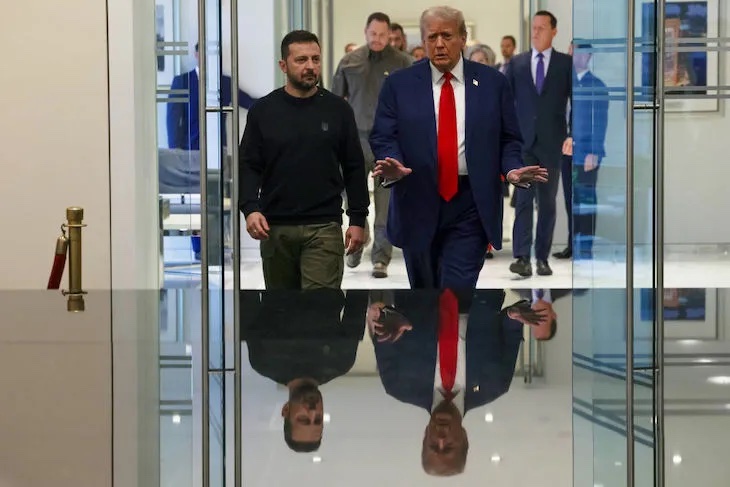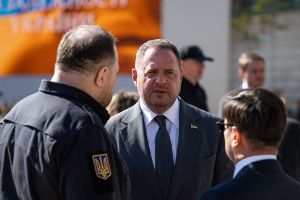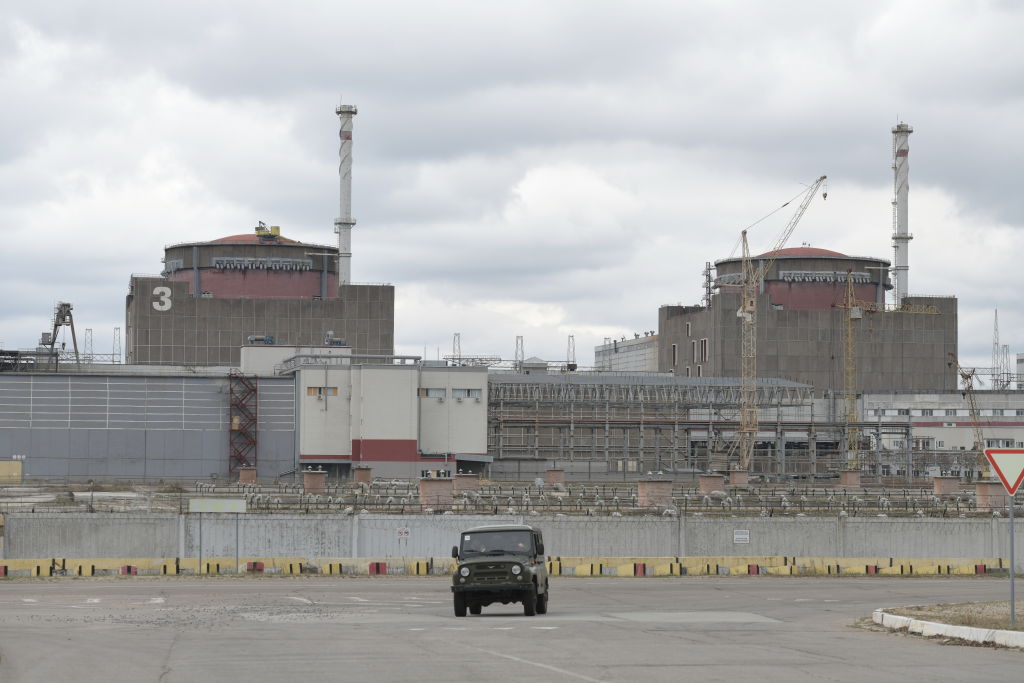Donald Trump’s election victory heralds the beginning of the end of the Ukraine war — and is likely to leave Vladimir Putin in control of most, if not all, of the territory he has seized in nearly three years of bloody conflict. To many Ukrainians, such an outcome will be a betrayal of their struggle, a stab in the back by the West that will sow decades of anger and resentment. To others, though, a swift end to the conflict before more land is lost and tens of thousands more young Ukrainians die represents the best hope of actually salvaging a decent future for their country before their infrastructure, economy, and an entire generation are annihilated completely.
“At this stage we are talking about survival, not victory,” says a former senior member of Volodymyr Zelensky’s cabinet who is now forming an opposition party in Kyiv. “What is important today is not fighting forever for lost territory. It’s making sure that Russia is no longer a military threat to us. That can only be done diplomatically, not militarily.”
Will Trump be a backstabber or a peacemaker? In public, Kamala Harris has come out as the stronger supporter of Kyiv, slamming suggestions that Ukraine should cede territory for the sake of peace with Moscow as “dangerous and unacceptable.” “They are not proposals for peace,” Harris said in September, “they are proposals for surrender.” Yet in practice, the Biden administration has effectively ignored Zelensky’s October peace plan, dialed down aid from $60 billion to $7.9 billion, and much of that non-lethal, and crucially refused to allow the Ukrainians to use long-range Western-supplied missiles to hit targets inside Russia. In other words, Harris’s plan was to continue funding Ukraine’s war effort indefinitely, but inadequately.
Trump, on the other hand, has promised to broker a swift end to the conflict. “They’re dying, Russians and Ukrainians,” Trump told a CNN Town Hall meeting in May 2023. “I want them to stop dying. And I’ll have that done — I’ll have that done in 24 hours.” But rather than preside over a Ukrainian capitulation, Trump claims that he will be tough on both sides. “I would tell Zelensky: ‘No more. You got to make a deal,’” Trump told Fox News in July. “I would tell Putin: ‘If you don’t make a deal, we’re going to give [Zelensky] a lot. We’re going to [give Ukraine] more than they ever got if we have to.’”
In other words, Trump’s plan is to push Russian President Vladimir Putin to negotiate by threatening to open the aid spigots for Ukraine — while also pressing Zelensky to the table by threatening to withhold aid. And many of the people tipped for Trump’s cabinet are strong Russia hawks, not appeasers. Both former Secretary of State Mike Pompeo, a possible defense secretary, and former national-security adviser Robert O’Brien, tipped for secretary of state, have criticized the Biden administration for restricting the use of US weapons and called for more sanctions on Russia. Indeed, Pompeo has backed creating a $500 billion lend-lease program to help Ukraine defend itself and also supports giving the country Nato membership — though O’Brien said last month that would be “too provocative at this point.”
Despairing Dems point to rejoicing in Moscow over Trump’s victory as evidence that a great betrayal is coming. “Kamala is finished… Let her keep cackling infectiously,” gloated former Russian president Dmitry Medvedev, who has frequently threatened nuclear strikes on the West. “The objectives of the Special Military Operation remain unchanged and will be achieved.” Conservative Russian friends of mine have bombarded me and their social media accounts with memes of a young Trump holding a white dove of peace, accompanied by hopeful messages of the imminent end of sanctions and the resumption of flights from Russia to Europe.
But despite years of Democratic accusations that Trump is a Putin shill or even agent, his first-term track record on dealing with Russia is actually pretty hawkish — despite the unfortunate optics of a 2018 summit in Helsinki where Trump appeared unduly sympathetic to the Russian leader. It was Trump who gave the green light for the United States to provide lethal aid to Ukraine in 2017, something Barack Obama had refused to do because of concerns about provoking Moscow. This April, Trump also came out as a supporter of the idea of a half-trillion-dollar lend-lease package for Ukraine as an alternative to aid grants. Trump also recently called Putin’s conditions for peace talks “not acceptable.”
After a September meeting with Zelensky at Trump Tower, Trump claimed that “we both want to see this end, and we both want to see a fair deal made…It should stop, and the President [Zelensky] wants it to stop, and I’m sure President Putin wants it to stop and that’s a good combination,” Trump said. In contrast, Zelensky told the New Yorker magazine that Trump “doesn’t really know how to stop the war” and called Vice-President-elect J.D. Vance “too radical” and “dangerous.”
In 2016, the Kremlin and its media were openly triumphant about Trump’s first victory. At the time, I attended an official US election party in Moscow, co-hosted by the Rossiya-1 TV channel, which featured large heroic oil paintings of Putin, Trump, and Marine Le Pen. “The world is going our way,” was the refrain of many of the conservative American revelers interviewed that night, and of the Kremlin’s TV coverage. This time round, however, the Kremlin has been far more cautious. Spokesman Dmitry Peskov has said that Putin will not congratulate Trump because the US is an “unfriendly” country — but said that Russia is “open to dialogue” even though peace cannot be achieved “overnight.”
There is one indisputable danger for Ukraine in Trump’s victory, however. Between now and the moment Trump takes office, the clock will be ticking for Putin’s forces to try to seize as much Ukrainian territory as possible before a ceasefire is brokered. It’s a critical moment for the Ukrainian war effort. According to Western militaries, up to 8,000 North Korean special forces have deployed in Kursk (inside Russia proper, not so far from occupied Ukraine) to repel a pocket of Ukrainian counter-invaders. Up to 80 percent of Ukraine’s energy infrastructure has been destroyed or damaged. If back-channel negotiations currently under way in Qatar between Russia and Ukraine on suspending mutual attacks on energy infrastructure fail, Russian attacks threaten to make major towns and cities effectively uninhabitable during the winter. A grinding Russian push through the northern Donbas is gaining momentum and could eventually threaten Ukraine’s second city, the largely Russian-speaking Kharkiv, with encirclement.
Ultimately, with the practical prospect of Ukraine being able to recapture its lost territories standing at less than zero, it is hard to see any difference between the final deal Harris would make and that which Trump will likely broker. What’s on the table is de facto rather than de jure partition of Ukraine along the line of control — wherever that may be at the moment of armistice — plus security guarantees for Ukraine short of full Nato membership. The only difference is that Trump’s threats to go full tonto on Putin’s backside if he fails to wind up his invasion are more credible than Harris’s empty promises ever were.
Watch more on SpectatorTV:
This article was originally published on The Spectator’s UK website.


























Leave a Reply